Key takeaways:
- Portrait photography workshops enhance both technical skills and emotional connections, emphasizing the art of storytelling through images.
- Hands-on experience, collaboration with peers, and dynamic feedback are crucial for growth and creativity in photography.
- Attendees should arrive with clear intentions, actively engage with others, and embrace experimentation for a fulfilling learning experience.
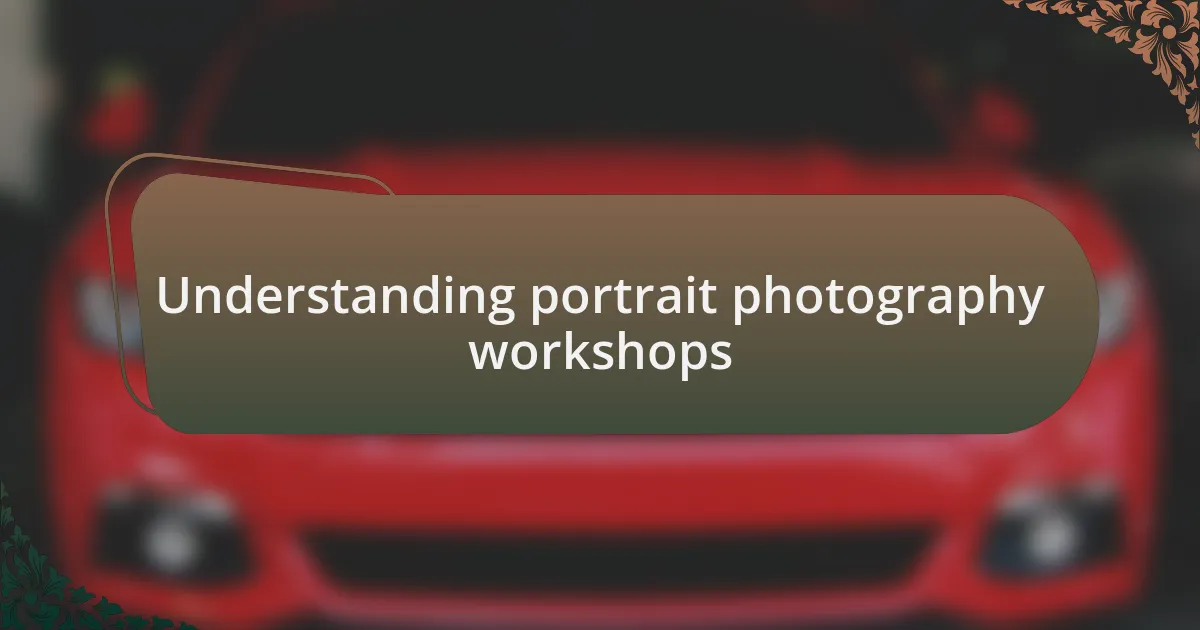
Understanding portrait photography workshops
Portrait photography workshops offer a unique opportunity to deepen your understanding of capturing human emotion and expression. I remember stepping into my first workshop, feeling a mix of excitement and anxiety, wondering whether I could truly convey the stories behind my subjects’ eyes. That experience taught me that workshops are not just about technical skills; they’re about connecting with people on a personal level.
Throughout these sessions, participants often explore different techniques, from using natural light to manipulating shadows and highlights. I once tried a technique that involved backlighting a subject, and the resulting image was more than just a photograph; it became a moment frozen in time, filled with nuances I hadn’t anticipated. Have you ever considered how lighting can completely change the mood of a portrait?
What I found particularly valuable in these workshops was the feedback from peers and instructors. Each critique, whether positive or constructive, pushed me to refine my vision and approach. It’s in those shared moments of vulnerability and creativity that real growth happens, helping us all to see portrait photography not just as a practice, but as a heartfelt art form.
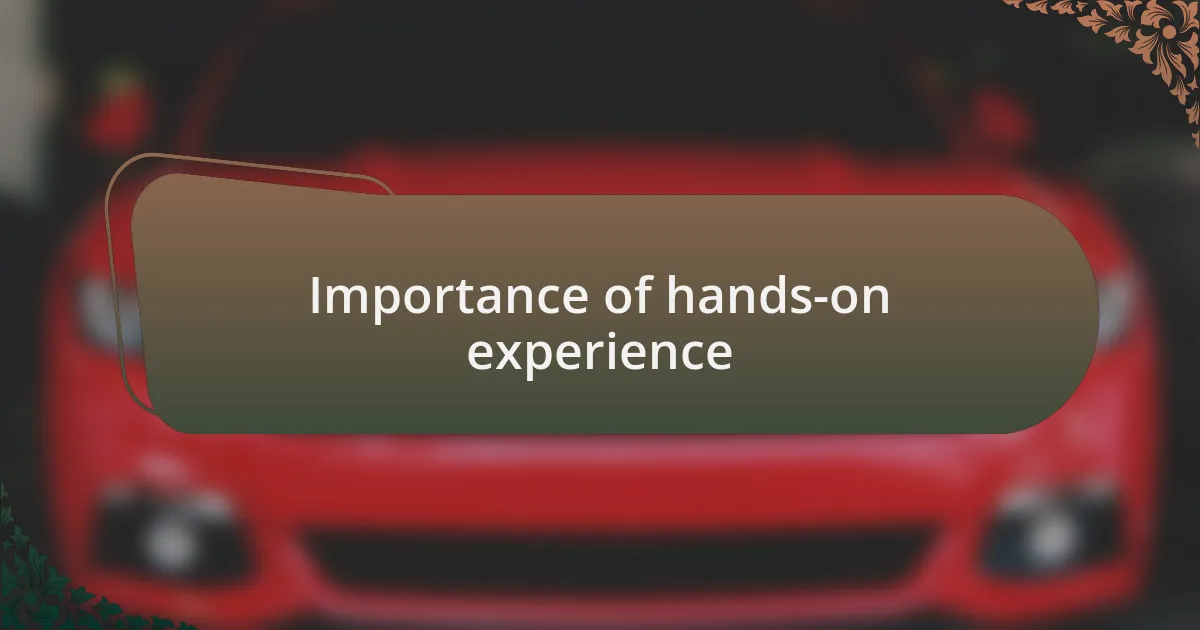
Importance of hands-on experience
Hands-on experience in portrait photography is invaluable, as it fosters a deeper connection between the photographer and the subject. I vividly recall the moment I was given the chance to direct a live shoot during a workshop. The nervousness I felt quickly transformed into exhilaration when I realized how to guide my subject to evoke genuine expressions. Have you ever noticed how a simple prompt can unlock an entirely new layer in a person’s personality?
Engaging directly with different lighting setups and backgrounds allowed me to experiment freely, which would have been difficult on my own. One particular session while shooting outdoors in the golden hour, I adjusted my positioning based on the shifting light, leading to a breathtaking shot that perfectly captured both warmth and intimacy. It reinforced for me that trial and error is a natural part of mastering photography. Do you remember the last time you had a breakthrough in your creative process?
Moreover, the dynamic interactions with fellow photographers provided a rich learning environment. Sharing tips and witnessing others’ techniques opened my eyes to approaches I had never considered before. I often found myself inspired by a friend’s method of connecting with their subject, realizing that each person had their unique way of telling stories through portraits. Isn’t it fascinating how collaboration can expand our creative horizons?
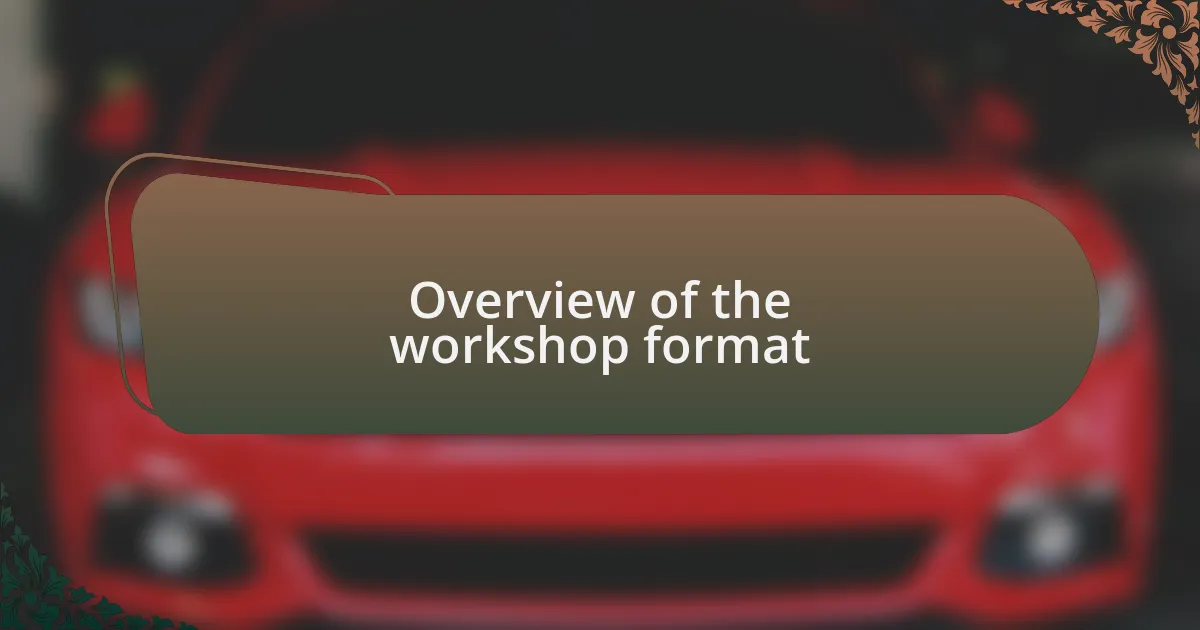
Overview of the workshop format
The workshop format typically revolves around a mix of practical shoots and focused discussions. In one session, we gathered in a well-lit studio to explore different portrait techniques. I remember the buzz of excitement as we exchanged ideas, and it felt like every moment was an opportunity to learn something new.
Each workshop often includes a section where participants can showcase their work. I was nervous when I presented my photos, but the feedback was incredibly constructive. It was a reminder that every critique is a stepping stone towards improvement. Have you ever felt that rush of adrenaline and vulnerability when sharing your creative work?
In addition, instructors frequently demonstrate their techniques live, allowing us to view the process in real-time. Watching them in action brought clarity to the nuances of framing and composition. I found myself jotting down notes while simultaneously feeling inspired to experiment with new angles myself. Isn’t it incredible how witnessing someone else’s passion can ignite your own?
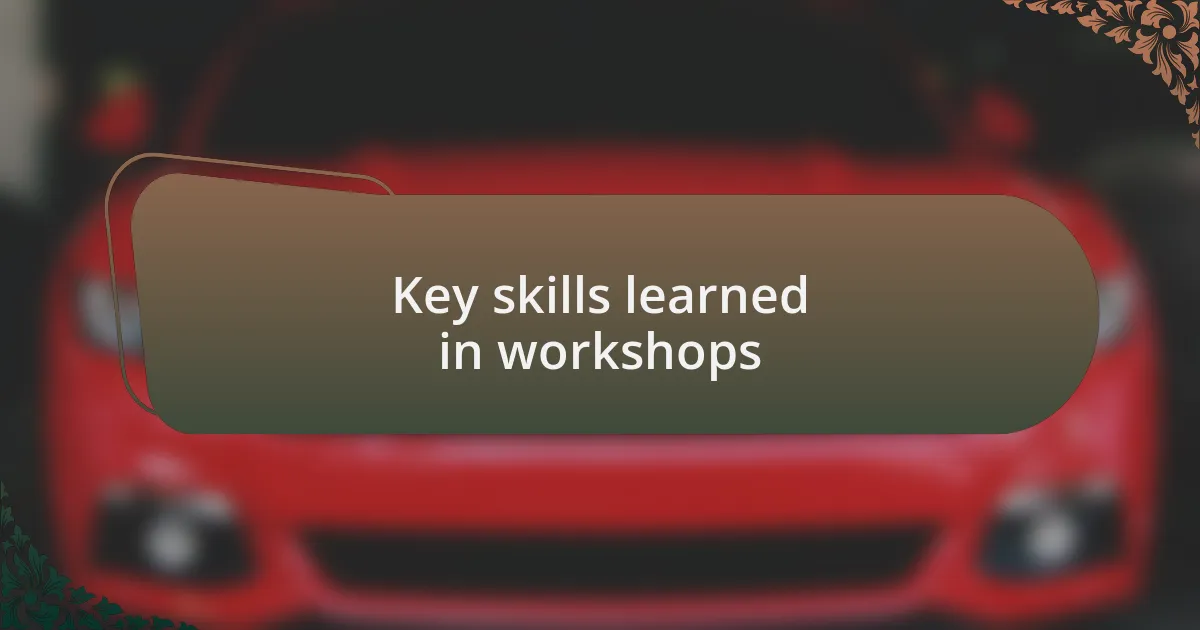
Key skills learned in workshops
One of the most significant skills I honed during the workshops was mastering lighting techniques. I vividly recall trying to capture the perfect shot of a subject against various light sources. At first, I struggled, unsure how to manipulate light to convey the right mood, but with each practice round, I began to understand how even small adjustments could transform an image. Have you ever noticed how a difference in light can completely change the emotion of a photograph?
Another vital skill that emerged was learning to communicate effectively with subjects. Initially, I was shy about directing models, but the instructors encouraged us to connect authentically. I remember one particular moment when I decided to simply chat with my subject about their interests. This approach helped both of us feel at ease, resulting in more genuine expressions that I could capture on camera. Isn’t interesting how establishing rapport can greatly influence the outcome of a portrait?
Lastly, I found that post-processing skills were an essential part of the learning process. During one session, we delved into editing software, and I was amazed at how editing could enhance or completely alter a photograph. While I had dabbled in editing before, the hands-on guidance opened my eyes to techniques I never considered. I remember feeling a sense of satisfaction when a simple adjustment turned a good photo into a stunning one. Have you ever had that moment where you realize the power of editing?
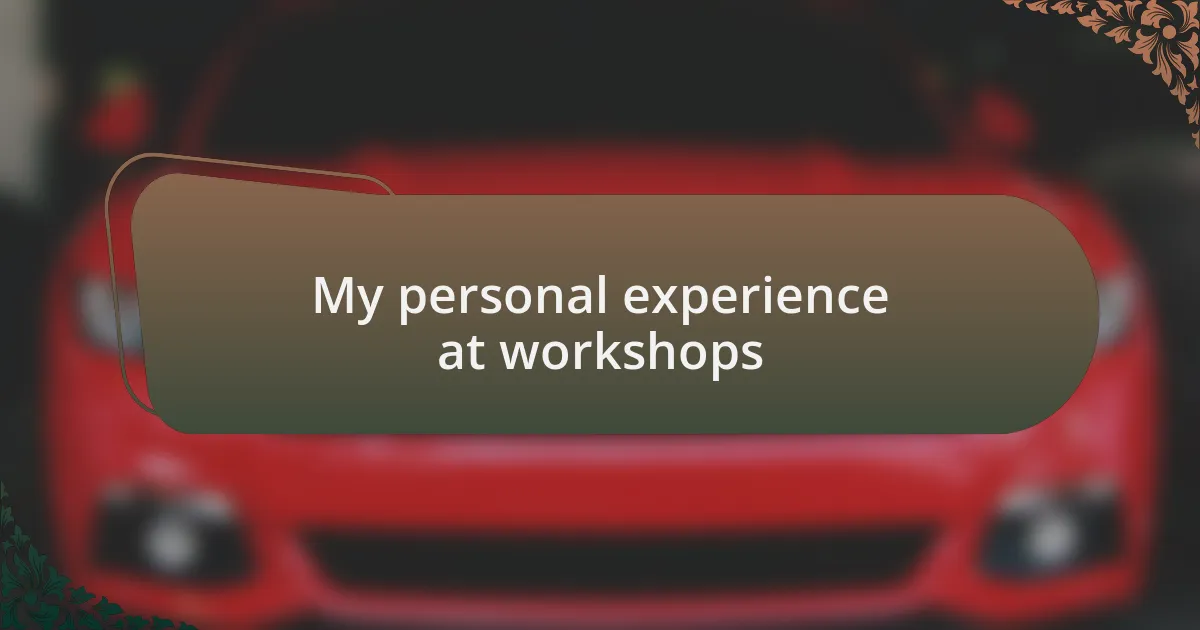
My personal experience at workshops
The workshops provided an opportunity for deep reflection, particularly on my personal style as a portrait photographer. I distinctly remember one session where we were asked to critique our own work. It was challenging to step back and view my photos objectively, but this exercise sharpened my understanding of what I wanted to convey through my art. Have you ever had to confront your own creative choices? For me, it was both daunting and liberating.
Emotional connection played a pivotal role in my experience during these workshops. There was an instance when I was able to capture the joy of a participant during a candid moment. It was as if time stood still, and I could see the genuineness behind their smile. This taught me that sometimes, the best portraits are about the story we tell, rather than just the technical aspects of the shot. Can you recall a moment when a photograph spoke to you beyond its surface?
As I engaged with fellow photographers, I realized the importance of a supportive community. One evening, we all gathered to share our favorite images and the stories behind them. Each person had a unique perspective, and hearing their experiences enriched my understanding of photography. It made me appreciate how collaboration can lead to growth. Don’t you think that exchanging ideas can truly elevate our craft?
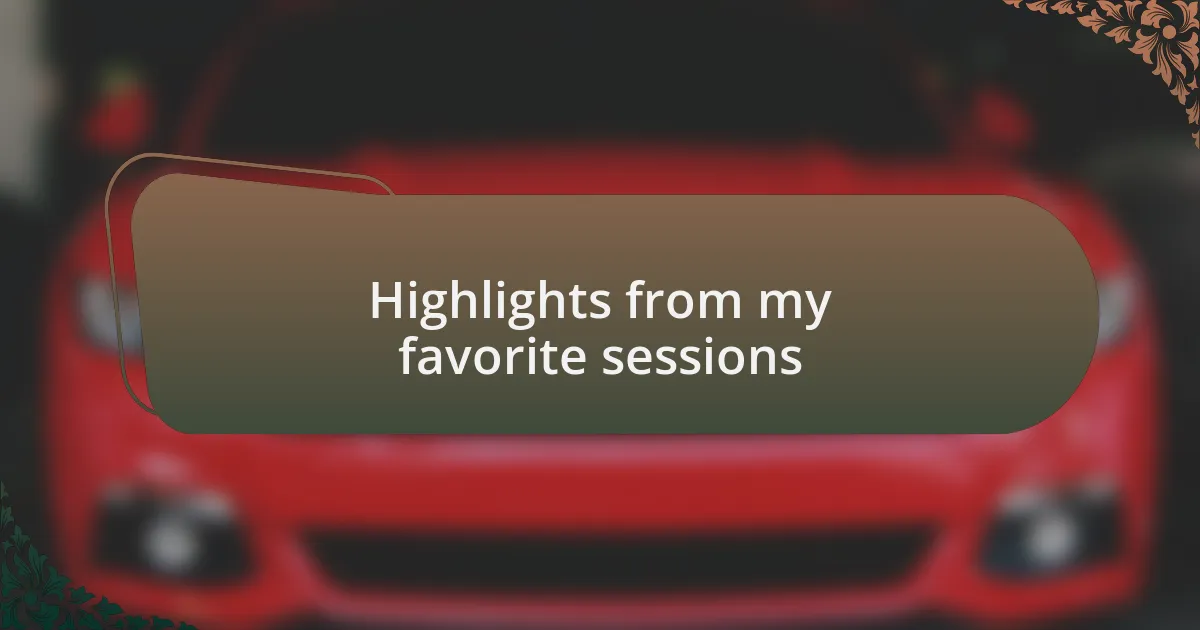
Highlights from my favorite sessions
One of my favorite sessions was a themed portrait day that truly ignited my creativity. We were given the challenge of interpreting emotions through props and lighting, and I remember vividly how a simple scarf transformed my subject’s expression from joyful to contemplative with just a shift in angle. It made me realize how powerful the right elements can be—do you have a favorite prop that you feel enhances your portraits?
During another session, we focused on utilizing natural light effectively. I found myself chasing the golden hour with my group, and the way the soft light wrapped around my subject was magical. I distinctly recall the thrill of capturing that perfect moment when the sun dipped just below the horizon, bathing everything in warmth. Doesn’t it feel incredible when nature aligns perfectly with your artistic vision?
Finally, I was part of a critique session that addressed the art of storytelling within our portraits. I shared an image of a grandmother laughing with her grandchild, and the feedback from my peers helped me see layers of emotion that I hadn’t noticed before. This experience reaffirmed my belief that every portrait can hold a narrative—what story do your images tell?
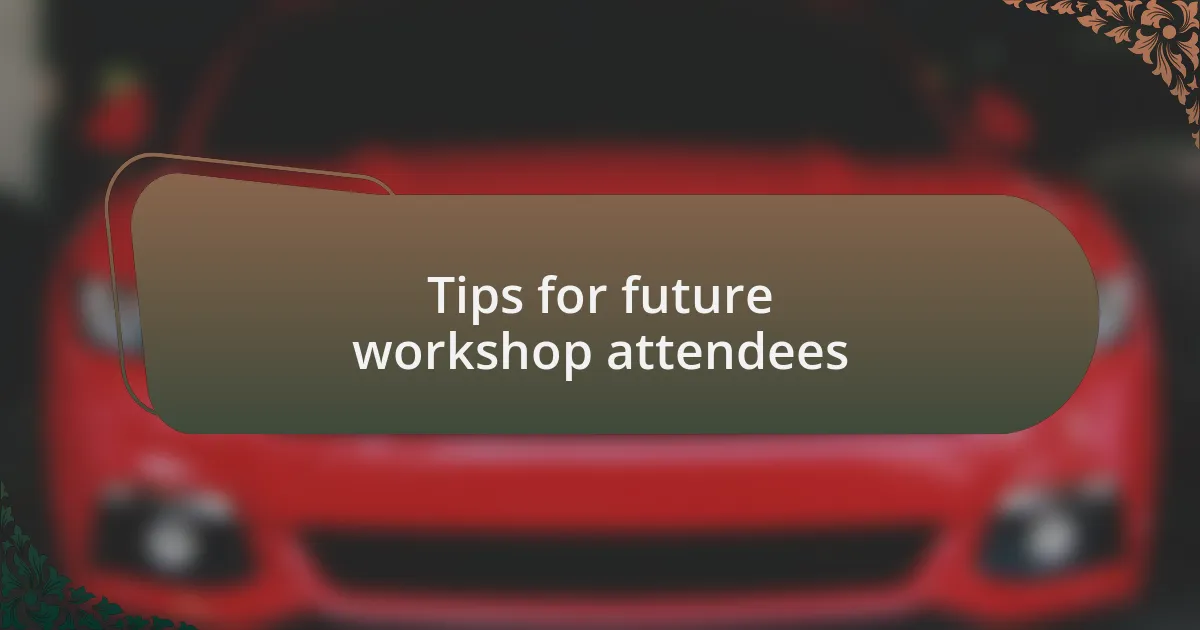
Tips for future workshop attendees
When attending a portrait photography workshop, I highly recommend arriving with a clear purpose. Think about what you want to achieve: Are you looking to master lighting techniques or develop your unique style? Setting your intentions can guide your focus and make your experience more fulfilling. I remember walking into a workshop aiming to improve my candid shots and left with a renewed sense of direction.
Another helpful tip is to actively engage with both the instructors and fellow participants. Don’t hesitate to ask questions, share your struggles, or seek feedback on your work. I distinctly recall a moment when I opened up about my difficulty in capturing authentic expressions. The instructor offered insights that were transformative for me—collaboration often leads to unexpected breakthroughs. Have you ever found that the best advice comes from an engaging discussion instead of solitary practice?
Lastly, be open to experimentation during the sessions. Sometimes the most magical outcomes arise from stepping outside your comfort zone. I once tried using an unconventional lens that completely changed the way I approached composition. That experience taught me to embrace the unexpected—what new technique could you explore that might turn an ordinary setup into something extraordinary?